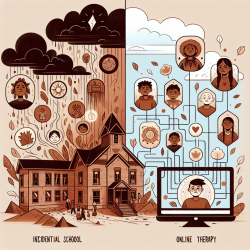Introduction
The legacy of residential schools in Canada has left profound impacts on the health and well-being of Indigenous populations. As practitioners working with Indigenous communities, understanding these impacts is crucial to providing effective support and therapy. The scoping review titled Residential schools and the effects on Indigenous health and well-being in Canada—a scoping review offers valuable insights into the health outcomes linked to residential schooling and provides a foundation for improving therapeutic practices.
Key Findings from the Research
The review analyzed 61 articles, focusing on the health impacts of residential schooling on First Nations, Métis, and Inuit populations. The findings highlight several critical areas:
- Physical Health: Residential school attendance is associated with poorer general health, increased rates of chronic diseases like diabetes, and infectious diseases.
- Mental Health: There is a strong correlation between residential school experiences and mental health issues such as depression, anxiety, and PTSD. Substance misuse and suicidal behaviors are also prevalent among survivors and their descendants.
- Intergenerational Effects: The negative health impacts extend beyond the survivors to subsequent generations, indicating a cycle of trauma that affects families and communities.
Implications for Practitioners
Understanding these findings is essential for practitioners to tailor their therapeutic approaches effectively. Here are some strategies to consider:
- Trauma-Informed Care: Incorporate trauma-informed practices that acknowledge the historical and ongoing impacts of residential schools. This involves creating a safe and supportive environment for clients to express their experiences.
- Cultural Competence: Engage with Indigenous cultural practices and knowledge systems. Collaborate with community leaders and elders to integrate traditional healing methods into therapy.
- Focus on Resilience: While the review highlights negative outcomes, it also points to resilience within Indigenous communities. Practitioners should focus on strengths and resilience factors that can aid in healing and recovery.
- Intergenerational Healing: Address the intergenerational trauma by involving family members in therapy sessions and facilitating open discussions about the impacts of residential schooling.
Encouraging Further Research
While the scoping review provides a comprehensive overview, there is a need for further research to explore the causal mechanisms of these health outcomes and identify effective interventions. Practitioners are encouraged to contribute to this body of research by documenting their therapeutic experiences and outcomes, which can inform future studies and improve practices.
Conclusion
Practitioners working with Indigenous communities must be equipped with knowledge about the historical impacts of residential schools to provide effective care. By integrating the findings from the scoping review into practice, therapists can support healing and foster positive health outcomes for Indigenous children and their families.
To read the original research paper, please follow this link: Residential schools and the effects on Indigenous health and well-being in Canada—a scoping review.










